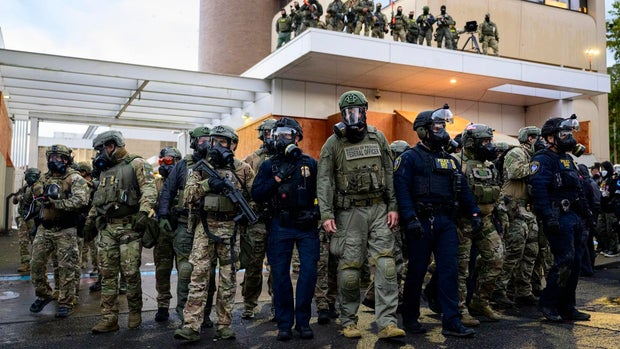Washington — A federal appeals court on Monday cleared the way for the Trump administration to mobilize and deploy members of the Oregon National Guard to Portland while a legal challenge moves forward.
A divided panel of three judges on U.S. Court of Appeals for the 9th Circuit agreed to freeze a lower court order that had blocked the Trump administration from sending Oregon National Guard troops to Portland to protect federal immigration personnel and property.
In its 2-1 ruling, the majority found the Trump administration is likely to prevail on the merits of its appeal by establishing that President Trump lawfully invoked a law known as Title 10 to bring Oregon’s National Guard into federal service and send them to Portland.
“The statute delegates the authority to make that determination to the President and does not limit the facts and circumstances that the President may consider in doing so,” Judges Ryan Nelson and Bridget Bade, both appointed to the 9th Circuit by Mr. Trump, said in the opinion for the court.
Mathieu Lewis-Rolland / Getty Images
The judges found that the “rather than reviewing the president’s determination with great deference,” the district court “substituted” its own findings related to the circumstances in Portland.
“Considering the totality of the circumstances, there is a colorable basis for the President’s determination that he is unable with regular forces to execute the laws of the United States,” the majority found.
Judge Susan Graber dissented and urged the full 9th Circuit to reconsider the case “before the illegal deployment of troops under false pretenses can occur.”
Oregon Attorney General Dan Rayfield echoed Graber’s call and encouraged the Portland community to ensure the city remains “peaceful and safe” while the legal proceedings continue.
“Today’s ruling, if allowed to stand, would give the president unilateral power to put Oregon soldiers on our streets with almost no justification,” he said in a statement. “We are on a dangerous path in America.”
U.S. District Judge Karin Immergut, appointed by Mr. Trump, had issued two temporary orders earlier this month regarding the president’s federalization and deployment of National Guard members. The first forbade the administration from mobilizing Oregon National Guard troops and sending them to Portland, a decision that was appealed to the 9th Circuit. But the second prevented the administration from deploying any federalized National Guard members in Oregon.
The Justice Department did not appeal that second decision, arguing instead that because it relies on the same legal reasoning as the first order regarding the Oregon National Guard, the district court would be required to dissolve it if the Trump administration succeeded in their bid for emergency relief. The 9th Circuit said in its decision that it agrees with the Trump administration that “the first TRO and the second TRO rise or fall together on the merits of the issues raised in this motion for a stay pending appeal.”
The dispute over Portland began in late September, when the president directed the Defense Department to coordinate the deployment of National Guard troops to Oregon. Defense Secretary Pete Hegseth soon issued a directive placing 200 members of the Oregon National Guard under federal control to protect immigration personnel and property at an immigration facility in Portland.
Oregon officials, however, objected to the deployment, and they filed a lawsuit arguing that Mr. Trump lacked the authority to federalize the Oregon National Guard. Immergut, the district judge presiding over the case, swiftly issued a temporary order blocking the Trump administration from implementing the September directive that ordered the federalization and deployment of the Oregon National Guard.
But following that order, the Trump administration said it would be sending 300 members of California’s National Guard to Portland. Mr. Trump had deployed members of the state’s National Guard in Los Angeles in response to protests over immigration enforcement actions, and the 9th Circuit allowed their continued deployment in June.
Immergut issued her second decision blocking the Trump administration from deploying any federalized National Guard members, which the Justice Department did not appeal.
Mr. Trump has relied on as law known as Title 10 to bring members of state-run National Guards under federal control and has sought to deploy troops to Los Angeles, Memphis, Portland and Chicago. The law allows the president to federalize members of any state’s Guard when he cannot execute U.S. laws with the regular forces or when there is a “rebellion or danger of a rebellion” against the government.
In its decision, the 9th Circuit ruled that “there is a colorable basis for the President’s determination that he is unable with regular forces to execute the laws of the United States.”


